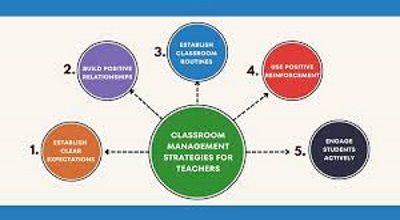Best Steps in Class Management
The Best Steps in Class Management are below. Effective class management is crucial for creating a positive and productive learning environment. Here are some of the best steps in class management:
Establish Clear Expectations:
- Set clear and consistent expectations for behavior, academic performance, and classroom procedures.
- Communicate these expectations to students and ensure they understand the consequences of both positive and negative behavior.
Build Positive Relationships:
- Foster positive teacher-student relationships. Show genuine interest in your student’s well-being and success.
- Create a supportive and inclusive classroom environment where students feel safe and respected.
Create a Positive Classroom Culture:
- Promote a positive atmosphere by celebrating successes, encouraging collaboration, and emphasizing the value of learning.
- Establish a sense of community within the classroom where students feel connected to each other.
Effective Lesson Planning:
- Plan engaging and well-structured lessons that cater to the diverse learning styles and abilities of your students.
- Be prepared with alternative activities and strategies to address unexpected challenges.
Proactive Classroom Management:
- Anticipate potential issues and be proactive in addressing them before they escalate.
- Use positive behavior reinforcement and redirection rather than relying solely on punitive measures.
Establish Routines:
- Establish consistent daily routines to create a sense of predictability for students.
- Clearly communicate and practice these routines to ensure smooth transitions between activities.
Fair and Consistent Discipline:
- Enforce consequences consistently and fairly to promote a sense of justice in the classroom.
- Focus on teaching students appropriate behavior rather than simply punishing undesirable actions.
Effective Communication:
- Maintain open and clear communication with students, parents, and colleagues.
- Address conflicts promptly and respectfully, involving all parties in finding solutions.
Differentiated Instruction:
- Recognize and accommodate diverse learning needs by employing differentiated instruction strategies.
- Provide support and challenge to students based on their abilities and requirements.
Self-Reflection and Adaptation:
- Regularly reflect on your teaching practices and be willing to adapt your approach based on student needs.
- Seek feedback from students, colleagues, and administrators to continually improve your classroom management skills.
Professional Development:
- Stay informed about new teaching methods, classroom management strategies, and educational research.
- Attend workshops and conferences and engage in ongoing professional development to enhance your skills.
Note
By combining these steps, teachers can create a positive and effective classroom management system that supports both academic achievement and the overall well-being of students.
